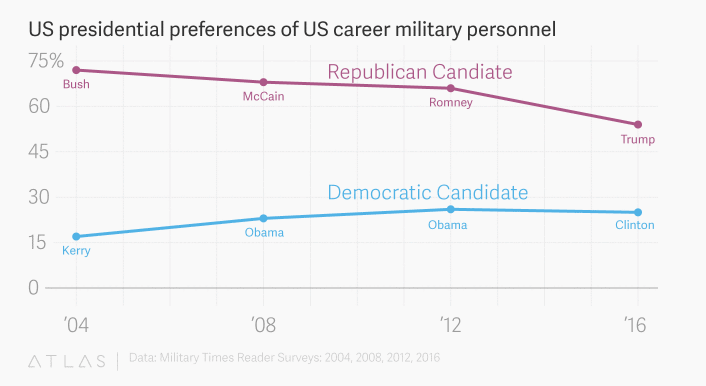
Republican presidential candidate Donald Trump speaks during a rally in Spokane, Wash., Saturday, May 7, 2016. Ted S. Warren/AP
Trump May Be the US Military’s Least-Liked GOP Presidential Candidate In Over a Decade
Mitt Romney, John McCain, and George W. Bush all polled higher, according to Military Times surveys.
US active-duty career military personnel would vastly prefer Donald Trump as president over Hillary Clinton. To even a casual observer of US politics that should be unsurprising; the military has for years preferred candidates from the political right.
A new survey conducted by Military Times find that 54% would vote for Trump, the likely Republican nominee, as against 25% for Clinton, the all-but-presumptive Democratic one, in a head-to-head matchup. However, though large, that’s a much smaller margin than the military has shown in the past for the Republican candidate.

In the last three presidential elections the Republican candidate has garnered at least 66% support in Military Times surveys. In October 2004, the month before his re-election, George W. Bush was the choice of 72% of career military service members. (This was 18 months after the US invaded Iraq.)
Military Times cautioned Quartz that each year’s survey has different methodologies and phrasing of questions, making them not directly comparable. For instance, in 2012, when the choice was between Barack Obama and Mitt Romney, the survey also included the options “decline to answer” and “other.” The most recent survey gave only “would not vote” as an alternative to the candidates.
Morever, the surveys from previous years were all conducted in October, a month before the election; this year’s was conducted in May, six months ahead, and before running mates have been chosen. The survey was also conducted before Ted Cruz suspended his campaign, so it included questions about a match-up between him and Clinton.
Finally, Military Times notes that this is not a scientific poll but a survey of its readership, which the publication says is biased towards officers and noncommissioned officers and against junior enlisted personnel. It says it “is representative of the more senior and career-oriented members of the force who run the military’s day-to-day operations and carry out its policies.”
Be that as it may, and although Republican support has diminished slightly in each consecutive presidential election-year survey, the 12-percentage-point drop in Trump’s support is striking. However, those voters aren’t going to be supporting Hillary Clinton either. Her support is one percentage point lower than Barack Obama’s was in 2012.
NEXT STORY: Soldier Takes Obama to Court Over War on ISIS